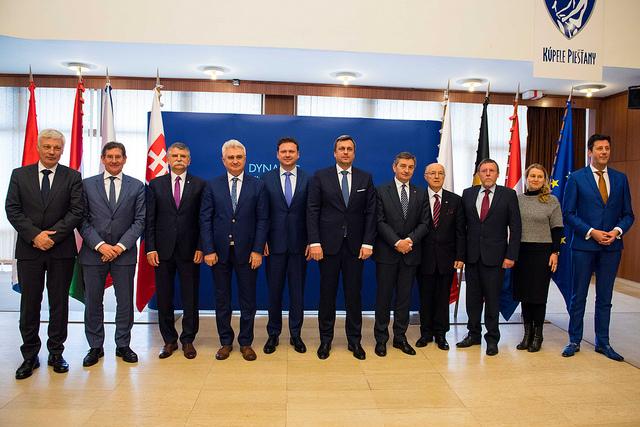The future of the European Union, the internal and external security of the Community, climate protection, the financial perspective for 2021 - 2027, the effects of Brexit, EU institutional reform - these were some of the topics discussed during a meeting of the presidents of the parliaments of the Visegrad Group and Benelux countries, which took place on Monday, March 25 in Piestany, Slovakia. Speaker of the Sejm Marek Kuchcinski took part in the discussion. The Senate in Slovakia was represented by Marshal Stanislaw Karczewski and Deputy Marshal Michal Sewerynski.
Speaking to reporters on the eve of the meeting, the Speaker of the Sejm stressed the need to consider changes in the functioning of the EU. - In order for member countries to claim that they are in a great Union of success, they must strengthen it, he said.
In a speech on Monday, Marek Kuchcinski noted that the goal should be to restore Europe's values. He also drew attention to the need for a new opening, which will be marked by the European Parliament elections in May. - National parliaments must be ready to promote such a vision of the Union's development that takes into account the needs of citizens and strengthens the role of national parliaments in the decision-making process, he said. The Speaker of the Sejm also spoke about the challenge facing the Union with regard to the decision on the Multiannual Financial Framework for 2021 - 2027, while stressing that outlays for cohesion policy and the common agricultural policy are the foundations of the Community and a serious factor in its legitimacy, and that an imbalance in the development of member states and regions will contradict the ideas that unite the Union.
Marek Kuchciński also pointed to the challenge of democratizing EU institutions. He stressed the need to streamline them and make their decisions more transparent. - We should see the European Union as a community of sovereign, solidarity-based nation-states that base their cooperation on the principle of "equal with equal, free with free, noble with noble," the Speaker of the Sejm said.
During a break in the meeting, Marek Kuchcinski spoke with media representatives. He stressed that the Visegrad Group has similar views on many issues and expects equal treatment of all EU countries.
Deputy Senate Speaker Michał Seweryński assessed that membership in the European Union is the foundation of Poland's policy on the international arena. He added, however, that there can be no place in the Community for the hegemony of larger member states. - It is a matter of all countries respecting basic European freedoms, he urged.
The host of the meeting, President of the National Council of the Slovak Republic Andrej Danko, spoke about the key challenges facing the Community: the migration crisis, Brexit and climate change. - The Union is our common home, which has no alternative. The dialogue of national parliaments is an added value in the EU, the Slovak politician said.
President of the Belgian House of Representatives Siegfried Bracke discussed the priorities of the Benelux countries in European cooperation. - The Union is about shared values. It has the ambition to bring people together and work for their common good. It will only be able to work if individual countries achieve its basic goals, he noted. Vice President of the Chamber of Deputies of Luxembourg Claude Wiseler, in turn, stressed the importance in the EU of respecting the voice of smaller states. The need to protect the rights of minorities and create an institutional framework suitable for this was also cited by Vice President of the Dutch Senate Joris Backer. In turn, President of the Benelux Parliament Gusty Graas discussed the history of integration of Belgium, the Netherlands and Luxembourg. And one of the main topics of the speech of the representative of the Belgian Senate Annemie Maes was the fight against climate change. - Member states should cooperate and have more solidarity in this regard, she said.
Brexit was an important topic of discussion. Chairman of the Chamber of Deputies of the Czech Republic Radek Vondráček drew attention to the importance and role of nation-states after Britain's possible exit from the Community. - Brexit weakens security in the EU. We have to cope with the fact that the balance of votes in the Union is changing," said in turn the President of the Hungarian National Assembly, László Kövér. According to the chairman of the Committee on European Affairs of the House of Representatives of the Netherlands, Hayke Veldman, the Union will need a comprehensive cooperation agreement after Brexit.
Vice President of the Senate of the Czech Republic Milan Štěch, in turn, stressed the need to strengthen social and economic cooperation in the EU. In his view, political integration should follow the convergence of positions in these areas.
During the press conference summarizing the meeting, the Speaker of the Sejm once again stressed that the European Union must be strengthened so that it is a success for all member states. He also noted the need to organize relations between the European Parliament and the parliaments of member states. In turn, President Danko said that the Visegrad Group "is a format that wants to reform the EU."
A bilateral meeting between Sejm Speaker Marek Kuchcinski and Hungarian National Assembly Speaker László Kover was also held on the sidelines of the talks in Piestany. The politicians discussed the celebration of the 30th anniversary of the fall of communism in Europe, cooperation within the Visegrad Group, and cultural cooperation between Poland and Hungary, including through the Waclaw Felczak Institute.
CIS
Photo: Marta Marchlewska/ KS
🎥Future and security of the European Union, consequences of Brexit, reform of the Community - these were discussed by the presidents of the parliaments of the Visegrad Group and Benelux during a meeting in Piešťany, Slovakia
🇵🇱🇨🇿🇸🇰🇭🇺🇧🇪🇳🇱🇱🇺 pic.twitter.com/IltVEVYRju- Sejm RP🇵🇱 (@Chancellery of the Sejm). March 26, 2019



